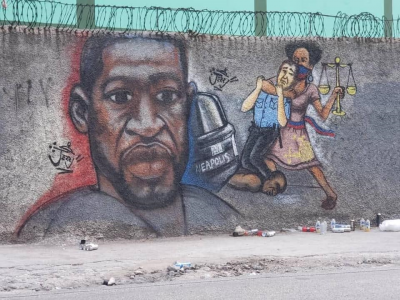Reimagining Haitian Exceptionalism

When Haiti is called “exceptional,” it is rarely in the positive sense of the term. An exceptional Haiti often refers to a strange and enigmatic place where the theories and practices applicable to other societies inexplicably fail. In Haitian literary studies, this concept is referred to as “Haitian exceptionalism,” an expression popularized by the late Michel-Rolph Trouillot in his brilliant essay entitled, “The Odd and the Ordinary.” In this essay written in 1990, Trouillot argues that Haiti is far too often represented as a grotesquely unique, strange, erratic, and therefore inexplicable place. In this same essay, Trouillot rejects Haitian exceptionalism in this form and encourages Haitianists to transcend this ideology which he described as “fiction [1].” According to Trouillot, the fiction of exceptionalism not only obscures Haiti’s place in the world but sets it beyond the realm of analysis or comparison. He also sees in this ideology a scapegoat that detracts from the accountability of Western powers in Haiti’s condition, which leads to a “silencing of history [2] “. Further, according to Trouillot, in its most repugnant form, this idea would imply that Haiti’s misfortune is due to a congenital illness of the Haitian mind which would deprive, for example, political dilemmas of rational explanations or practical solutions.
Considering Trouillot’s call to transcend the fiction of Haitian exceptionalism as depicted in the literature, this essay aims to reimagine the term as a means of asserting Haiti’s rightful place in world history.
By “Haitian exceptionalism,” we do not see the idea that Haiti is exceptionally strange, incomprehensible and enigmatic, but rather that it occupies a special place among the nations and is disposed to a “manifest destiny,” which consists of siding with the most vulnerable and defending the freedom of the oppressed.
This manifestation of positive exceptionalism finds its match in American exceptionalism, a doctrine that maintains that the United States embodies the purest form of political freedom and democracy and is endowed with the unique mission of transforming the world. Our ideology of an exceptional Haiti in no way reflects this ethic of superiority over other nations; rather, it is rooted in a superlative humanist vocation. This view of an exceptional Haiti is not new. It was shared by pioneer thinkers such as Baron de Vastey, chronicler and secretary to King Christophe, who saw in the struggle of the African slaves a manifestation of the will of God himself [3]. In his book, The Colonial System Unveiled, he writes: “Great God! How great are your works! It is from a herd of slaves that your Almighty formed the elements necessary to avenge your divine laws [4].”
Such an exceptional history necessarily implies exceptional responsibilities. In fact, since obtaining its independence after achieving the first successful slave revolt in the modern world, Haiti has always assumed a role of defender of freedom and served as a refuge for the world’s afflicted. It was even written in the first constitution dated from 1805: “he who is a slave becomes automatically free by setting foot on Haitian soil.” Moreover, in 1815, when Simón Bolívar hit rock bottom in his struggle for the liberation of Latin America, it was in the arms of the young Haitian republic that he took refuge; and from Haitian President Alexandre Pétion, he received the necessary support to continue his fight against the Spanish troops.
In return, Pétion made only one request: the abolition of slavery wherever Bolívar would command. In 1822, President Boyer embraced the liberation struggle of the Grecian people, deciding that Haiti should not remain indifferent to it. He saw in Haiti and Greece a similarly long history of oppression and promised to do everything in his power to help the cause of the Hellenes. At the beginning of the 20th century, faced with the rise of Nazism, Haiti not only renounced the Hitler regime, but also opened its doors to persecuted European Jews. Thus, even with its challenges, Haiti has always assumed its moral responsibility as a defender of justice and protector of the oppressed, thus fulfilling its manifest destiny.
Today, racial discrimination and social inequality continue to limit opportunities for many around the world. In the United States, more than fifty years after the struggle for civil rights, African Americans find themselves having to affirm that “black lives matter.” Faced with these situations, Haiti cannot remain indifferent. It must continue at all costs to shake off the yoke of servitude wherever it can and to express its unconditional support for the oppressed of this world. Consequently, this “exceptional” country needs more courageous men and women who believe, deep down in their souls, in this “Haitian greatness” and in the universal mission of this chosen people.
The time has finally come for us to live up to our history and claim our rightful place among the nations. It is our duty to fulfill our manifest destiny, to continue to inspire the nations and to carry the torch of freedom for the oppressed people of this world.
*
Note to readers: please click the share buttons above or below. Forward this article to your email lists. Crosspost on your blog site, internet forums. etc.
Notes
[1] Trouillot, M. R. (1990). The Odd and the Ordinary: Haiti, the Caribbean, and the World. Cimarrón: New Perspectives on the Caribbean, 2(3), 3.
[2] Trouillot, M. R. (1995). Silencing the past: Power and the production of history. Beacon Press
[3] Charles, A. (2002). Haitian exceptionalism and Caribbean consciousness. Journal of Caribbean Literatures, 3(2), 115-130.
[4] Vastey, B. P. V. (1814). Le système colonial dévoilé. Cap-Henry : P. Roux Imprimerie du Roi. Print.
Featured image is from the author

